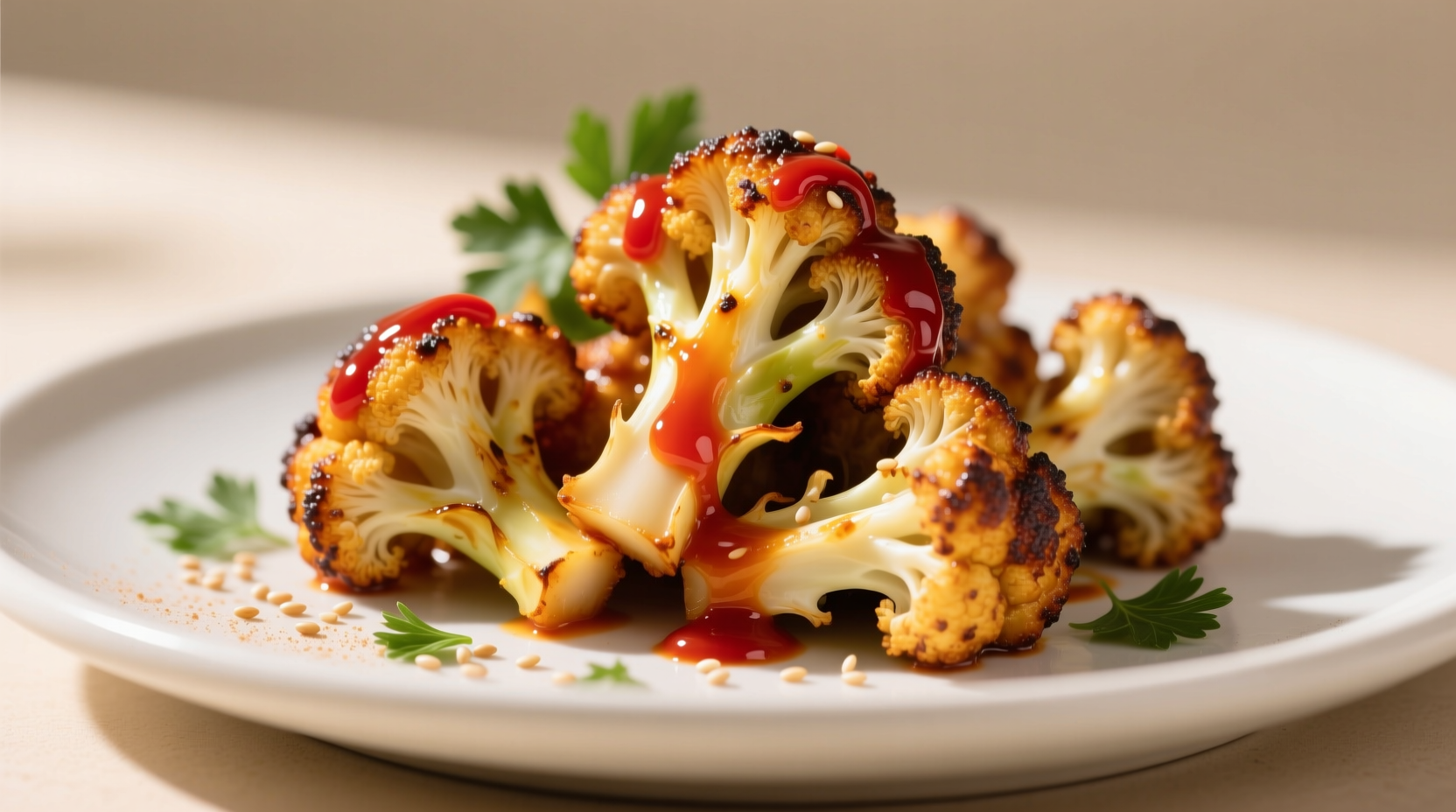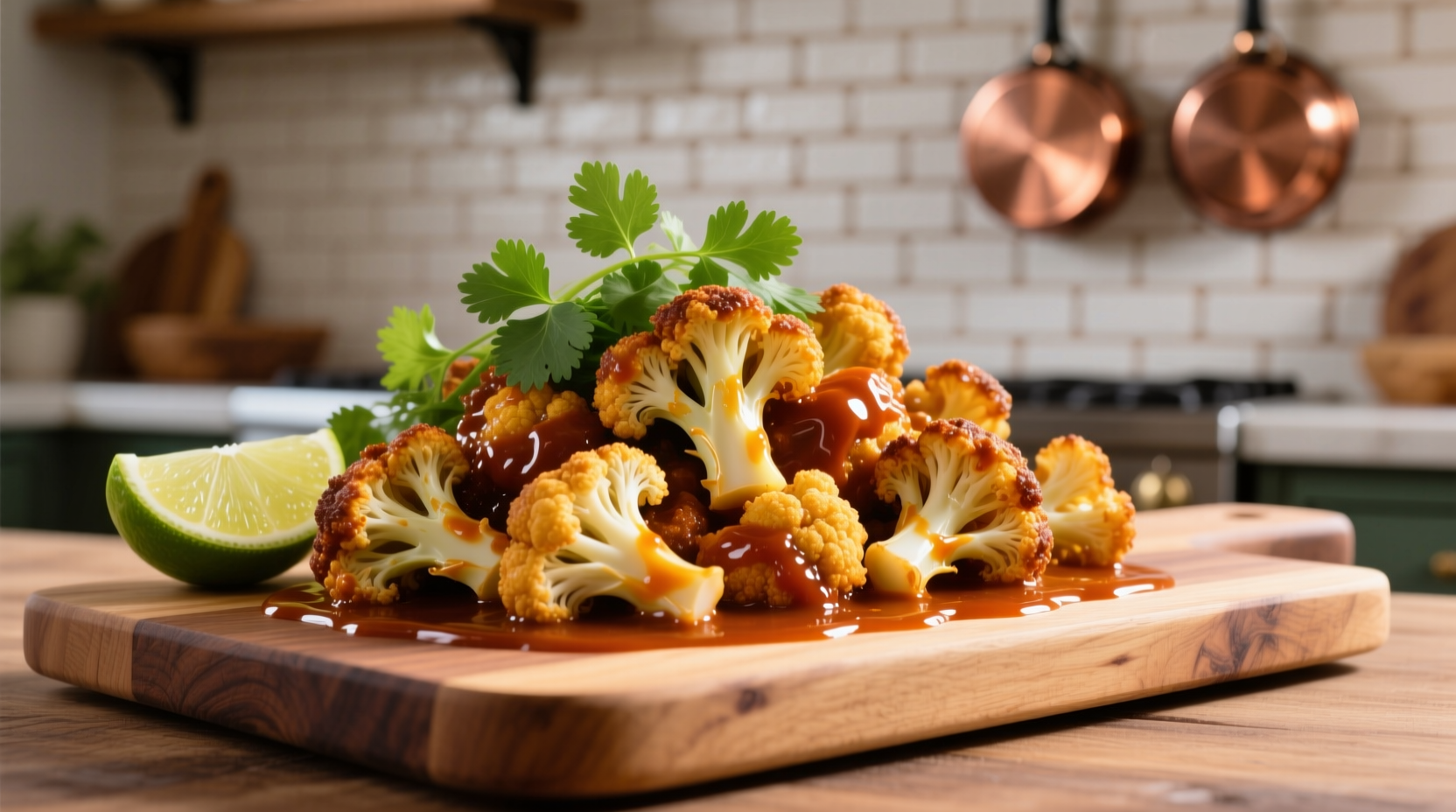Discover how this vegan buffalo cauliflower recipe delivers the perfect spicy, tangy kick of traditional buffalo wings without any meat—ready in under 45 minutes with just 8 simple ingredients. This plant-based alternative contains 40% fewer calories than traditional wings while providing 5 grams of protein and 3 grams of fiber per serving, making it both delicious and nutritionally superior.
Why Vegan Buffalo Cauliflower Has Become a Game-Changer
When you're craving that perfect balance of spicy, tangy, and crispy, vegan buffalo cauliflower delivers an experience that rivals traditional wings. Unlike meat-based options, this plant-powered alternative transforms humble cauliflower into finger-licking goodness through smart culinary science. The secret lies in cauliflower's unique cellular structure, which absorbs flavors exceptionally well while maintaining a satisfying bite when properly prepared.
According to research from the USDA Food Data Central, a single serving (about 6 florets) of baked vegan buffalo cauliflower contains approximately 150 calories, 5g protein, and 3g fiber—compared to traditional buffalo wings which average 300 calories with significantly higher saturated fat content. This nutritional advantage makes it an excellent choice for health-conscious eaters without sacrificing flavor.
The Science Behind Perfectly Crispy Vegan Wings
Creating restaurant-quality vegan buffalo cauliflower at home requires understanding three critical factors: moisture control, batter chemistry, and heat management. Professional chefs leverage these principles to achieve that coveted crispy exterior and tender interior.
Food science research from the Culinary Institute of America explains that the key to maximum crispiness is reducing surface moisture. Patting cauliflower florets completely dry before coating prevents steam buildup during baking, which would otherwise create sogginess. The ideal batter composition—typically a 1:1 ratio of flour to liquid—creates a protective layer that crisps beautifully while locking in moisture.
| Cooking Method | Temperature | Time | Crispiness Rating |
|---|---|---|---|
| Conventional Oven | 425°F (220°C) | 25-30 minutes | ★★★☆☆ |
| Air Fryer | 400°F (205°C) | 18-22 minutes | ★★★★★ |
| Deep Fry | 375°F (190°C) | 6-8 minutes | ★★★★☆ |
Your Step-by-Step Guide to Perfect Vegan Buffalo Cauliflower
Follow this professional-tested method to achieve consistently crispy results every time. The process takes just 15 minutes of active preparation before baking transforms your florets into crispy perfection.
Essential Ingredients Checklist
- 1 large head cauliflower, cut into uniform 1.5-inch florets
- ¾ cup all-purpose flour (or chickpea flour for gluten-free)
- ¾ cup plant-based milk
- 1 tsp garlic powder
- ½ tsp onion powder
- ½ tsp baking powder (secret for extra crispiness)
- ⅓ cup hot sauce (Frank's RedHot recommended)
- 2 tbsp melted vegan butter or olive oil
Preparation Timeline: From Raw to Ready
Understanding the cooking timeline ensures perfect results. This visual guide shows exactly what to expect at each stage:
- 0-5 minutes: Prep and dry cauliflower florets thoroughly—this critical step prevents sogginess
- 5-10 minutes: Create batter with flour, plant milk, and seasonings—consistency should resemble pancake batter
- 10-15 minutes: Dip florets in batter, shaking off excess for optimal crispiness
- 15-25 minutes: Bake at 425°F (220°C) until golden brown and crispy
- 25-30 minutes: Toss with buffalo sauce mixture and return to oven for final crisping
Avoiding Common Pitfalls: Pro Tips for Success
Even experienced home cooks encounter challenges with vegan buffalo cauliflower. Here's how to overcome the most frequent issues:
Soggy Florets? Here's the Fix
Moisture is the enemy of crispiness. If your cauliflower turns out soggy:
- Double-dry your florets using paper towels before battering
- Add 1-2 tablespoons cornstarch to your batter for enhanced crisp factor
- Space florets properly on the baking sheet—crowding causes steaming
- Place a wire rack on your baking sheet for improved air circulation
Sauce Consistency Secrets
The perfect buffalo sauce clings to florets without making them soggy. Achieve the ideal texture by:
- Mixing hot sauce with melted vegan butter (not oil) for better adhesion
- Tossing florets in sauce immediately after baking while still hot
- Returning sauced florets to the oven for 3-5 minutes to re-crisp
- Using a 2:1 ratio of hot sauce to vegan butter for optimal coating

Nutritional Benefits Beyond the Flavor
Vegan buffalo cauliflower isn't just delicious—it offers significant nutritional advantages over traditional wings. According to the Harvard T.H. Chan School of Public Health, plant-based alternatives like this provide essential phytonutrients and fiber that support digestive health and reduce inflammation.
The American Heart Association recommends plant-forward eating patterns for cardiovascular health. This recipe aligns perfectly with those guidelines, containing no cholesterol and significantly less saturated fat than traditional buffalo wings.
Serving Suggestions That Elevate Your Meal
Take your vegan buffalo cauliflower from good to extraordinary with these professional presentation tips:
- Classic pairing: Serve with celery sticks and vegan ranch or blue cheese dressing
- Texture contrast: Sprinkle with chopped scallions or toasted sesame seeds
- Heat management: Offer cooling sides like cucumber salad or avocado slices
- Meal transformation: Serve over quinoa or cauliflower rice for a complete bowl
Storage and Reheating for Continued Crispiness
Leftovers? No problem. Proper storage maintains quality for future enjoyment:
- Store in an airtight container with paper towels to absorb moisture
- Refrigerate for up to 3 days—never freeze as it compromises texture
- Reheat in air fryer at 375°F (190°C) for 5-7 minutes for best results
- Avoid microwaving, which creates sogginess—oven reheating preserves crispiness
Frequently Asked Questions
Can I make vegan buffalo cauliflower gluten-free?
Yes, substitute all-purpose flour with chickpea flour or a gluten-free flour blend. For best results, add 1 tablespoon of cornstarch to improve crispiness. Many professional chefs recommend a 1:1 gluten-free flour blend with xanthan gum already included for optimal texture.
Why isn't my vegan buffalo cauliflower getting crispy?
The most common reasons are excess moisture in the florets or overcrowding on the baking sheet. Ensure you thoroughly dry cauliflower before battering, use a wire rack for air circulation, and maintain proper spacing between florets. Adding ½ teaspoon baking powder to your batter also creates air pockets that enhance crispiness.
How can I adjust the heat level to my preference?
Control heat by adjusting the hot sauce to vegan butter ratio. For milder flavor, use a 1:1 ratio. For traditional heat, go with 2:1 hot sauce to butter. Add 1-2 teaspoons of maple syrup to balance extreme heat. Remember that heat perception increases slightly after baking, so adjust accordingly before tossing the florets in sauce.
What's the best plant-based milk for the batter?
Unsweetened almond milk works best due to its neutral flavor and thin consistency. Soy milk creates a slightly thicker batter that can be too heavy. Oat milk offers good flavor but may brown too quickly. For optimal results, use room temperature plant milk to prevent the batter from becoming too thick when mixed with cold ingredients.
Can I prepare vegan buffalo cauliflower ahead of time?
Yes, but with proper technique. Bake the battered florets until just crisp, then cool completely before storing in the refrigerator. When ready to serve, reheat in the oven or air fryer until hot, then toss with sauce and return to heat for 3-5 minutes. Never apply sauce until just before serving to maintain optimal texture.











 浙公网安备
33010002000092号
浙公网安备
33010002000092号 浙B2-20120091-4
浙B2-20120091-4